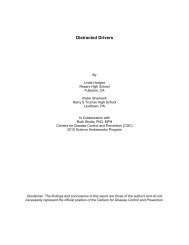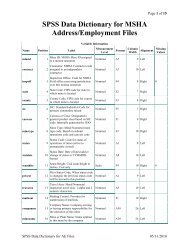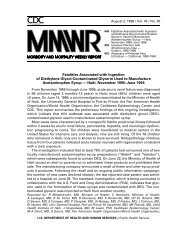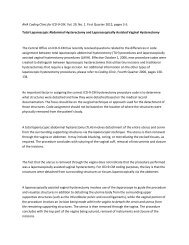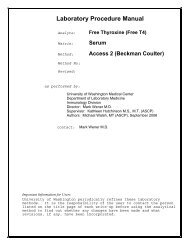Measuring Bullying, Victimization, Perpetration, and Bystander ...
Measuring Bullying, Victimization, Perpetration, and Bystander ...
Measuring Bullying, Victimization, Perpetration, and Bystander ...
You also want an ePaper? Increase the reach of your titles
YUMPU automatically turns print PDFs into web optimized ePapers that Google loves.
<strong>Victimization</strong>: Who is the victim of others’ aggression, who is for instance hit, teased, yelled at, or gossiped about?<br />
Names of the pupils in the class: Never Seldom Sometimes Quite Often Very Often<br />
1. <br />
2. <br />
3. <br />
4. <br />
5. <br />
6. <br />
7. <br />
8. <br />
9. <br />
10. <br />
Scoring Instructions<br />
Points are assigned as follows:<br />
Never = 0 Seldom = 1<br />
Sometimes = 2 Quite Often = 3<br />
Very Often = 4<br />
As a peer-nomination measure, the names of all<br />
students in the class should be listed in the first<br />
column on each table. Respondent data for fellow<br />
classmates are considered peer-estimated data,<br />
while data about him/herself are considered selfestimations.<br />
Peer-estimated scores are computed by calculating<br />
the mean rating for each student: the sum of the<br />
peer-nomination ratings for each respondent (a<br />
respondent’s self-estimation should be excluded<br />
when computing these scores) divided by the total<br />
number of respondents present, minus one (the<br />
child him/herself). Higher scores in each section<br />
indicate more experience with construct being<br />
assessed in that section.<br />
References<br />
Österman, K., Björkqvist, K., Lagerspetz, K. M. J.,<br />
L<strong>and</strong>au, S. F., Fraczek, A., & Pastorelli, C. (1997).<br />
Sex differences in styles of conflict resolution: A<br />
developmental <strong>and</strong> cross-cultural study with data<br />
from Finl<strong>and</strong>, Israel, Italy, <strong>and</strong> Pol<strong>and</strong>. In D. P. Fry,<br />
& K. Bjorkqvist (Eds.), Cultural variation in conflict<br />
resolution: Alternatives to violence (pp. 185–197).<br />
Mahwah, NJ: Lawrence Erlbaum Associates.<br />
Björkqvist, K., & Österman, K. (1995). PECOBE<br />
Peer Estimated Conflict Behavior: An inventory for<br />
the measurement of conflict behaviour in school<br />
children. Vasa, Finl<strong>and</strong>: Åbo Akademi University.<br />
Developer’s Contact Information<br />
Kaj Björkqvist, PhD<br />
Åbo Akademi University, Finl<strong>and</strong><br />
Developmental Psychology<br />
Vasa, Finl<strong>and</strong><br />
P.B. 311, FIN-65101<br />
Tel: +358 6 3247 469<br />
kaj.bjorkqvist@abo.fi<br />
105









